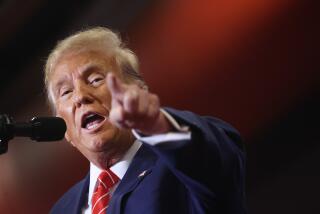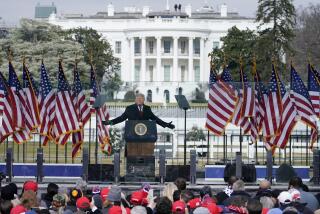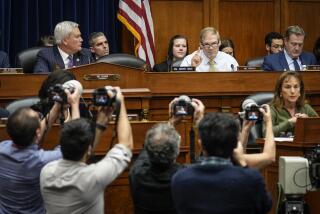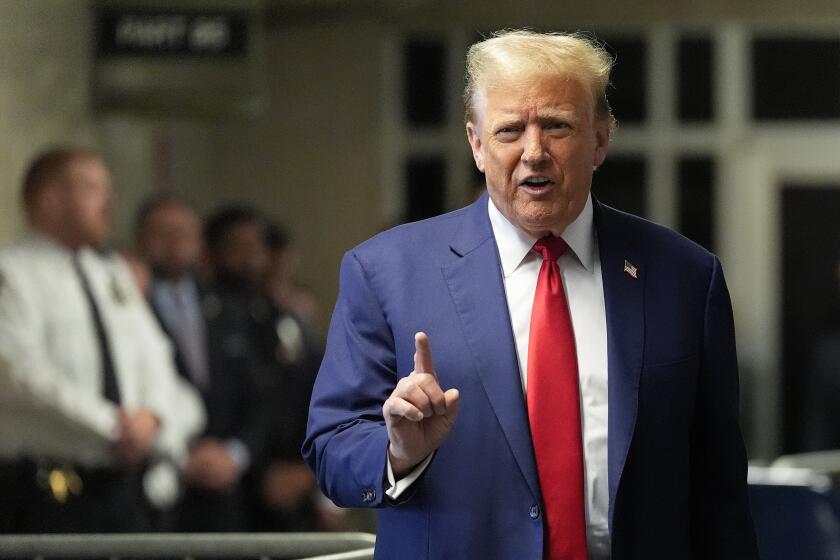Testing the Truth of Conflicting Charges
True or false?
Every factual claim made in the course of the impeachment debate is subject to factual review by members of the House Judiciary Committee. But that did not put a stop to the litany of charges and countercharges of questionable accuracy in Friday’s debate. Some of the most contentious claims:
Question. Is censure constitutional or not?
Answer. Republicans said the Constitution sets forth impeachment as the only alternative for removing a president who has committed high crimes and misdemeanors. That is correct.
But they also asserted that a censure resolution is unconstitutional because it is not mentioned in the Constitution. Most scholars say that this is not true. Congress passes resolutions frequently and in 1837 censured President Andrew Jackson. Congress cannot punish the president--for example, by forcing him to pay a fine--but it can condemn his conduct.
*
Q. Did impeachment proceedings against Nixon take place at a time when U.S. troops were engaged in combat in Vietnam?
A. Democrats argued that the House should not have gone forward with an impeachment vote while U.S. forces were fighting in Iraq. Senior Republican Rep. F. James Sensenbrenner Jr. of Wisconsin countered that the Nixon impeachment debate in 1974 took place during the Vietnam War.
The war did not end until the spring of 1975, when North Vietnamese forces captured Saigon. But the Vietnam War was not an issue during the Nixon impeachment because the last U.S. ground forces left Indochina on March 29, 1973, well before the impeachment drive got underway.
*
Q. Why did the House Judiciary Committee not include a charge of tax fraud in its impeachment case against Nixon?
A. Democrats said that the Watergate impeachment panel considered one article charging Nixon with tax fraud but rejected it because it did not rise to the level of an impeachable offense. They argued that, similarly, President Clinton’s private wrongdoing does not rise to the level of an impeachable offense.
Republican Rep. Charles T. Canady of Florida argued that the tax fraud charge against Nixon was rejected because Judiciary Committee members thought it was unproven.
Both sides are partly correct. The Judiciary Committee did not go forward with a Nixon impeachment charge on tax fraud, and several Democrats explained their vote by saying that tax violations fell short of an impeachable offense. But some committee Republicans said that they voted against it because the charge was not proven.
*
Q. Is the impeachment charge backed up by evidence and witnesses?
A. Democrats said that the Republican-controlled Judiciary Committee approved its impeachment charges without hearing any witnesses or testing their credibility. Independent counsel Kenneth W. Starr brought witnesses before his grand jury where they were questioned by his prosecutors. They were not questioned by outsiders, including lawyers for Clinton. Starr said that he never spoke to witnesses, such as Monica S. Lewinsky.
Republicans said the panel had “voluminous” evidence, including 60,000 pages of material delivered by Starr’s office. They also said the Democrats did not choose to call such witnesses as Lewinsky or Linda Tripp.
Both sides are correct. No first-hand witnesses testified before the committee. On the other hand, it had a thick file of transcripts submitted by Starr.
*
Q. Is the president the chief law enforcement officer of the United States?
A. Proponents of impeachment declared many times that Clinton’s alleged perjury and obstruction of justice are all the more significant because he is the chief law enforcement officer of the United States. If the person at the top of the hierarchy goes unpunished for such offenses, they argued, lesser law enforcement officers could be emboldened to flout the same laws.
The U.S. Constitution says the president is responsible “to take care that the laws be faithfully executed.” However, by statute, the attorney general is in charge of federal law enforcement.
More to Read
Get the L.A. Times Politics newsletter
Deeply reported insights into legislation, politics and policy from Sacramento, Washington and beyond. In your inbox three times per week.
You may occasionally receive promotional content from the Los Angeles Times.








